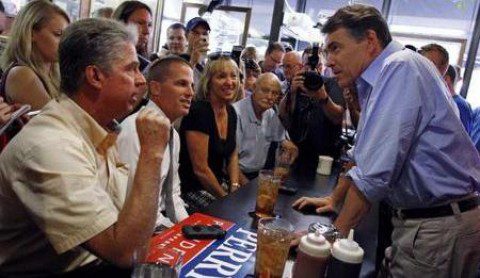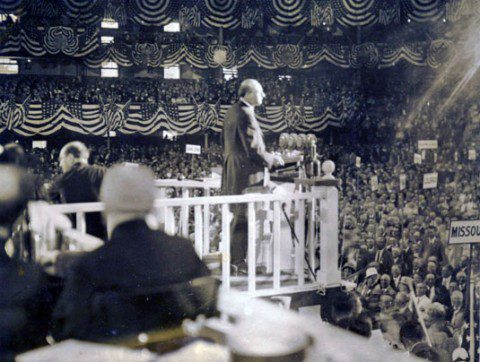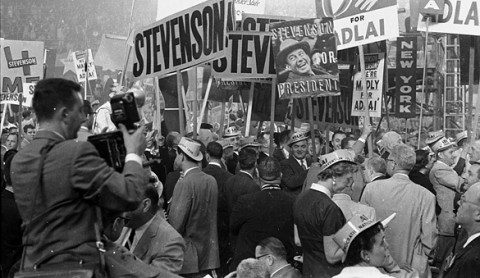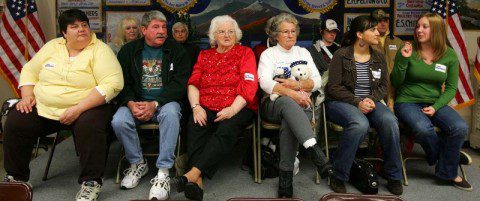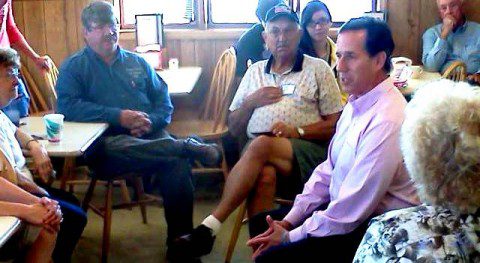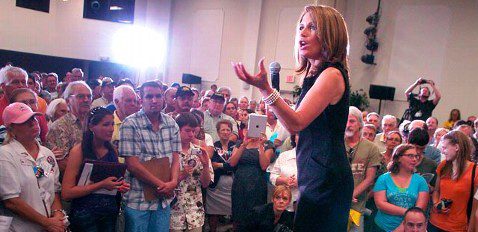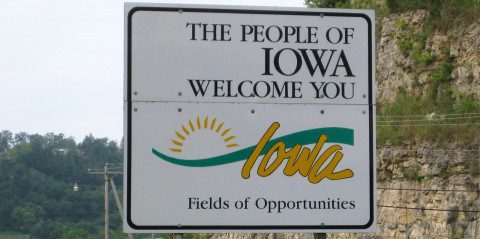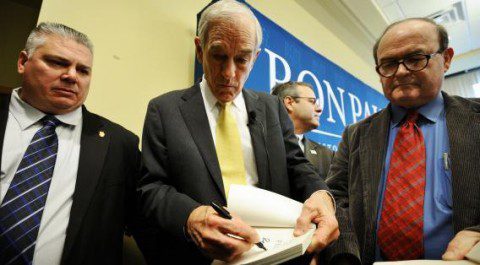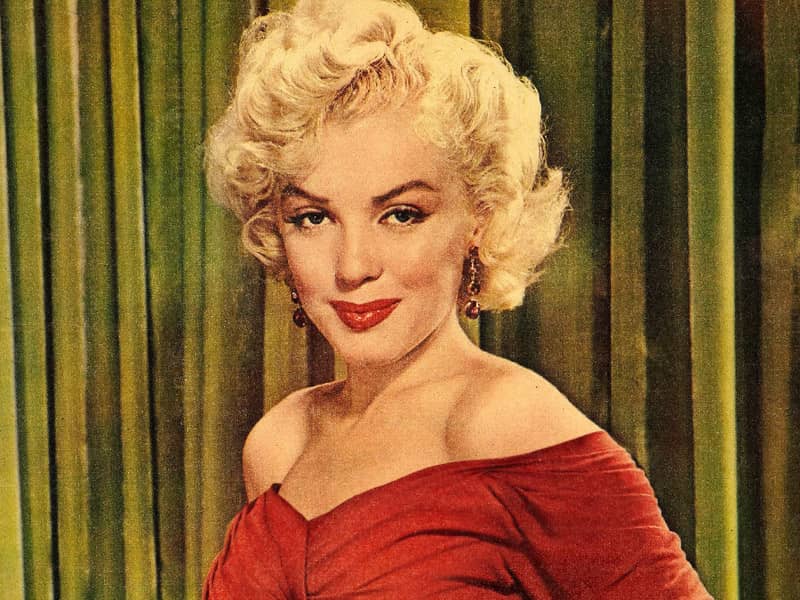Rick Perry campaigns in Iowa
Why does anybody care about Iowa? To folks in California and New York it’s down there somewhere in the ”flyover states” between Manhattan and Hollywood. Many Americans wonder if it should be pronounced “Ohio” and aren’t sure if it’s next to Idaho or Indiana. It’s midwestern, largely rural and agricultural. The name of its state capital, Des Moines, is unpronounceable: Is it Dez-MOYNZ? Or maybe Duh-MOW-een? How about Dee-MOYN?
“During the fall and early winter of every fourth year, the United States turns its full attention to the state of Iowa,” writes Josh Clark for the website HowStuffWorks: “The Des Moines Register newspaper gets the kind of political clout that the Washington Post or the New York Times do when its editors reveal which candidates their paper officially endorses.
“Average Joes and Janes are interviewed by out-of-town national correspondents over coffee and pie in the local diner about what issues are most important to them. And almost every candidate in the presidential race virtually moves to the state to spend months campaigning throughout Iowa.”
Michelle Bachmann meets the press in Iowa
But why Iowa? And what is a caucus anyway?
Every four years, Democrats and Republicans — and for that matter, Libertarians, Greens and most of the other “third parties” — use
caucuses and primaries to select their party’s presidential nominees.
In the past, the appearance was that the choice was made behind closed doors in “smoke-filled rooms” by the party elite at national conventions. Primaries and caucuses are supposed to eliminate that impression — instead giving everyone a voice.
A candidate is chosen from a list of hopefuls. In the primaries, secret ballots are cast and the top candidate wins. In caucuses, the vote is taken in public meetings in living rooms, grade school auditoriums and fire station meeting halls. If a candidate wins a majority of the state primaries and caucuses, his or her national nomination is assured.
However, it’s not always that simple.
The 1924 Democratic convention
In the 1960 Democratic convention in Los Angeles, John F. Kennedy was selected on the first ballot. On the other hand at the 1924 Democratic convention in New York, it took 103 ballots over three exhausing weeks to nominate John W. Davis, who then lost to Republican Calvin Coolidge.
At conventions such as the 1924 Democratic event, there can be a deadlock between the frontrunners with some votes tied up by ”favorite son” candidates. For example, in 1932, Oklahoma voted for cowboy philosopher Will Rogers — although he had no chance of winning the nomination, much less the White House. By doing so, Oklahoma got to play “hard to get” — waiting to see what the front-runners would offer for their vote in one of those legendary smoke-filled rooms, behind closed doors.
A parade during the 1956 Democratic convention
Over the years, national conventions have seen a lot of pageantry and theatrics — and not just by the candidates. On the tenth ballot of the
1924 convention, the Kansas delegation unexpectedly threw its votes to California governor William McAdoo. Ecstatic McAdoo supporters led a noisy parade around the vast convention hall holding high the Kansas banner as all the other McAdoo states followed behind – everyone waving pictures of McAdoo and placards and banners proclaiming him ”Democracy’s Hope.” Finally, the chairman’s gavel brought order and voting resumed. Immediately, more chaos ensued as New Jersey threw its votes to New York Governor Al Smith. Another parade erupted with confetti streaming down from the balconies as New York and New Jersey led supporters up and down the aisles while a brass band played “Tramp, Tramp, Tramp, the Boys are Marching.”
Such conventions were a lot of fun — and can still happen today. In fact caucuses make such surprises still possible.
A caucus in Indianola, Iowa
Federal law doesn’t dictate how states choose their delegates, so each decides whether to have a primary, caucuses, a convention — or a combination of all three. Some also have a “straw poll,” which isn’t binding on anybody, but attracts a lot of media coverage. Most states have primaries — where voters statewide simply cast a secret ballot for their favorite candidate. Then at a state convention, delegates who are publicly committed to the winner are selected to attend the national convention.
The caucus system is slightly more complicated. Every neighborhood in the state has a mini-convention. These usually take a couple of hours and can take place in living rooms, school gymnasiums, church fellowship halls or anywhere else the neighborhood chooses. At these “precinct” meetings, supporters of the various candidates speak.
A caucus in Ottumwa, Iowa
Then all registered vcters who are a member of that party and who live in that neighborhood vote for delegates who have announced
they support a particular candidate. The winners of the precinct meetings then attend county conventions where some of them are selected to attend the state convention. At the state convention, some of them are selected to attend the national convention.
It would seem that they just show up at the convention, vote for the winner and go home. However, again, it’s not that simple.
Depending on the state, delegates are not required to vote for the candidate they originally supported. For example, at the upcoming Iowa caucuses, a precinct may elect John Smith and Betty Jones who both support Ron Paul. At the county convention, John and Betty are expected to run or at least vote for another Ron Paul supporter to go to the state convention.
A caucus at an Iowa school
However, if their candidate has dropped out of the race, they can switch to another candidate. Sometimes they are obligated to support their original candidate in the first ballot. However, if there is no winner, they are free to switch to another candidate in the next ballot.
That makes sense — since if they couldn’t switch, the second, third and even 100th ballots would continue to be identical — with nobody winning since nobody could change their vote.
So, in the Iowa caucuses, more than 1,000 neighborhoods will have local debates. At the end, Iowans will vote — and the national press will headline the winner.
The winner of the Iowa caucuses is a big deal. But why?
Bachmann talks to voters
Should Michelle Bachmann or Rick Santorum or Rick Perry have a last-minute surge in popularity, it will be the hot topic on talk shows for days. In 2008, Arkansas Gov. Mike Huckabee won the Iowa
caucuses – then weeks later finished well in the New Hampshire primary. That gave him enormous momentum to keep going. A win in Iowa can be worth millions of dollars — money that candidates need to buy more ads and pay more campaign workers for the primaries and caucuses in other states.
More money means more TV commercials, more billboards, more bumper stickers and more workers posting appeals on Facebook and Twitter and talking on the phone, pleading with voters to show up at their state’s primaries and caucuses – and to donate more money.
Those candidates who do poorly in Iowa may hang in there until the New Hampshire primary a few weeks later. However, those who finish poorly will drop out of the race since donations to lesser candidates decline dramatically — with contributions to the frontrunners surging.
So, winning in Iowa means big bucks.
Welcome to Iowa!
But why Iowa? Wouldn’t it make more sense for such an influential event to take place in New York or California — or Texas?
Iowa is largely rural and heavily Christian, but recently legalized same-gender marriage. It was part of the Louisiana Purchase, gained statehood in 1846 as a non-slave state as a result of the Missouri Compromise and sent troops to fight for the Union during the War Between the States. More chickens and pigs live there than humans.
Yet the votes cast at the Iowa caucus are so highly coveted that news agencies and political organizations take frequent polls to find out what Iowans are thinking. Why is Iowa so important?
“The simplest answer is that Iowa is the first state in the nation to have a chance to show its support for candidates,” writes Clark. ”The level of support a candidate receives in Iowa gives a reasonable indication of how they will perform with the rest of American voters.
“If middle-American Iowans support a candidate, then that candidate has a chance with the rest of the nation. The results from the Iowa caucus tell a candidate whether his or her platform is desirable.
“A strong showing in Iowa also sends a message to the national party leaders.”
Rick Perry campaigns in Iowa
But Iowa wasn’t always first. New Hampshire used to hold that honor.
“New Hampshire has a state law that says it must be the first state to
hold a primary in a presidential election,” notes Clark. “But because Iowa holds a caucus rather than a primary, it has remained the first state to hold any kind of vote on candidates for both parties since 1976.”
When other states have attempted to have primaries before New Hampshire’s, that state just moved its primary up. However, it hasn’t done so in response to Iowa — although there has been debate that it should do so.
During the 1976 presidential race, Jimmy Carter spent a year conducting a revolutionary campaign in Iowa. He spent immense sums of money sending campaign workers into every precinct. The strategy was to go to even the tiniest caucus meetings — and to win them all. As a result, he swept the county elections and the Iowa state convention.
Since then, candidates have spent an inordinate amount of time in even the smallest communities, hoping to duplicate his startling win.
Ron Paul gives an autograph
“But does Iowa deserve the power that it yields?” asks Clark. ”Some observers scoff at the importance placed on a state with so few people, but time and again, the impact Iowa’s caucus has on elections is tangible.
“In the history of these caucuses, no candidate who has ever finished worse than third among the candidates has even gone on to win the nomination,” David Yepsen, a political columnist for the Des Moines Register, told ABC News.
So, yes, Iowa is important.
Any candidate that finishes lower than third will have a very tough time fighting back to the top.
And an Iowa win could mean the White House
